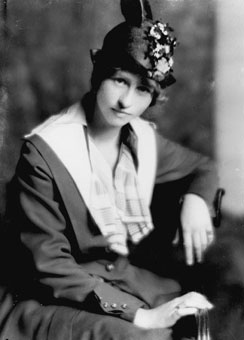Ah, could I lay me down in this long grass
And close my eyes, and let the quiet wind
Blow over me—I am so tired, so tired
Of passing pleasant places! All my life,
Following Care along the dusty road,
Have I looked back at loveliness and sighed;
Yet at my hand an unrelenting hand
Tugged ever, and I passed. All my life long
Over my shoulder have I looked at peace;
And now I fain would lie in this long grass
And close my eyes.
Yet onward!
Cat birds call
Through the long afternoon, and creeks at dusk
Are guttural. Whip-poor-wills wake and cry,
Drawing the twilight close about their throats.
Only my heart makes answer. Eager vines
Go up the rocks and wait; flushed apple-trees
Pause in their dance and break the ring for me;
And bayberry, that through sweet bevies thread
Of round-faced roses, pink and petulant,
Look back and beckon ere they disappear.
Only my heart, only my heart responds.
Yet, ah, my path is sweet on either side
All through the dragging day,—sharp underfoot
And hot, and like dead mist the dry dust hangs—
But far, oh, far as passionate eye can reach,
And long, ah, long as rapturous eye can cling,
The world is mine: blue hill, still silver lake,
Broad field, bright flower, and the long white road
A gateless garden, and an open path:
My feet to follow, and my heart to hold.

Edna St. Vincent Millay was one of the most lauded poets of the 20th century. Speaking to a generation of Americans disillusioned by the trauma of World War I, she charged the nation with her melodious voice and her daring verse. A poet, playwright, lyricist, lecturer, and translator, Millay’s work ignites traditional forms and examines deeply personal as well as political themes, making her both a modern poet and a progressive one. In 1923, she won the second annual Pulitzer Prize for Poetry. Published in Second April (1921), “Journey” appears alongside many of her most famed sonnets about romantic passion, the art of poetry, and the juxtaposition between body and soul.
“Journey” describes a speaker’s walk down the path of life. The balance of enjambed lines and end-stopped lines gives the poem forward momentum, like a walk. “Journey” has a traditional form, yet sings a song of movement and progression. The poem falls into blank verse, the same style used in epic poetry, a genre focused on journeys as well. Blank verse creates an outwardly conversational feel that is in fact internally structured, balancing the free-spirited, independent nature of the journey of the speaker with the notion of a greater plan. With bright, lively imagery characteristic of Millay, the speaker describes her struggle to continue living her life in a purpose-driven manner, ignoring the temptation of sweeter things that beckon to her from either side.
The speaker walks a “sweet path,” yet has a plan that even the loveliest “apple trees” cannot dissuade her from. The speaker does not belittle the beauty of the nature that tempts her; in fact, she acknowledges the roughness of her “hot” and “dragging” lifestyle. However, she proclaims “Onward!” in the spirit of determination to complete her journey. This poem is one of Millay’s more personal poems, using form and content to characterize her independent yet controlled and complex nature. “Journey” captures Millay’s role as an icon for women in the 20th century, as her verse and her public persona captured the spirit of reformism and voice for a generation of women.
